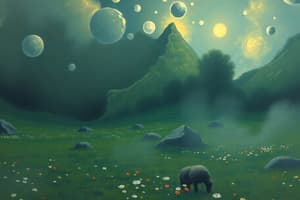Podcast
Questions and Answers
The earth is surrounded by a huge blanket of ______.
The earth is surrounded by a huge blanket of ______.
air
Nitrogen and ______ are two gases which make up the bulk of the atmosphere.
Nitrogen and ______ are two gases which make up the bulk of the atmosphere.
oxygen
Green plants use ______ to make their food and release oxygen.
Green plants use ______ to make their food and release oxygen.
carbon dioxide
Bacteria change the form of ______ so that plants can use it.
Bacteria change the form of ______ so that plants can use it.
The increased volume of ______ is affecting the earth's weather and climate.
The increased volume of ______ is affecting the earth's weather and climate.
The greenhouse effect is caused by carbon dioxide, which traps heat radiated from the ______.
The greenhouse effect is caused by carbon dioxide, which traps heat radiated from the ______.
Humans and animals take ______ from the air as they breathe.
Humans and animals take ______ from the air as they breathe.
When the level of carbon dioxide in the atmosphere increases, it leads to ______ warming.
When the level of carbon dioxide in the atmosphere increases, it leads to ______ warming.
The average weather condition of a place for a longer period of time represents the ______ of a place.
The average weather condition of a place for a longer period of time represents the ______ of a place.
The degree of hotness and coldness of the air is known as ______.
The degree of hotness and coldness of the air is known as ______.
The amount of insolation decreases from the equator towards the ______.
The amount of insolation decreases from the equator towards the ______.
Air pressure is defined as the pressure exerted by the weight of air on the ______.
Air pressure is defined as the pressure exerted by the weight of air on the ______.
In areas where temperature is high, the air gets heated and ______.
In areas where temperature is high, the air gets heated and ______.
Low pressure is associated with cloudy skies and ______.
Low pressure is associated with cloudy skies and ______.
High pressure is associated with clear and ______ skies.
High pressure is associated with clear and ______ skies.
The air always moves from high pressure areas to ______ pressure areas.
The air always moves from high pressure areas to ______ pressure areas.
The movement of air from high pressure area to low pressure areas is called ______.
The movement of air from high pressure area to low pressure areas is called ______.
Winds can be broadly divided into three types: permanent, seasonal, and ______.
Winds can be broadly divided into three types: permanent, seasonal, and ______.
The wind blowing from the west is called ______.
The wind blowing from the west is called ______.
Cyclones in Odisha are caused by three factors: wind velocity, rain, and ______.
Cyclones in Odisha are caused by three factors: wind velocity, rain, and ______.
The winds of up to 260 km per hour lasted for over ______ hours during the supercyclone.
The winds of up to 260 km per hour lasted for over ______ hours during the supercyclone.
Sometimes when the wind blows gently, you can see it blowing away ______ or fine dust.
Sometimes when the wind blows gently, you can see it blowing away ______ or fine dust.
The local wind of the northern plains of India is called ______.
The local wind of the northern plains of India is called ______.
The trade winds, westerlies, and easterlies are examples of ______ winds.
The trade winds, westerlies, and easterlies are examples of ______ winds.
Heavy rain occurred under the influence of the ______ for three days continuously.
Heavy rain occurred under the influence of the ______ for three days continuously.
The cyclone originated as a 'depression' in the Gulf of ______, near east of Port Blair.
The cyclone originated as a 'depression' in the Gulf of ______, near east of Port Blair.
When the air is full of water vapour we call it a ______ day.
When the air is full of water vapour we call it a ______ day.
On a humid day, clothes take longer to dry and sweat from our body does not evaporate easily, making us feel very ______.
On a humid day, clothes take longer to dry and sweat from our body does not evaporate easily, making us feel very ______.
Clouds are just masses of such water ______.
Clouds are just masses of such water ______.
Precipitation that comes down to the earth in liquid form is called ______.
Precipitation that comes down to the earth in liquid form is called ______.
There are three types of rainfall: the convectional rainfall, the orographic rainfall and the ______ rainfall.
There are three types of rainfall: the convectional rainfall, the orographic rainfall and the ______ rainfall.
When trees on hill sides are cut, rainwater flows down the bare mountains and can cause flooding of low lying ______.
When trees on hill sides are cut, rainwater flows down the bare mountains and can cause flooding of low lying ______.
The rise in temperature causes the snow in the coldest parts of the world to ______.
The rise in temperature causes the snow in the coldest parts of the world to ______.
When hot air rises, cold air from the surrounding area rushes to fill in the ______.
When hot air rises, cold air from the surrounding area rushes to fill in the ______.
The layer of the atmosphere where almost all weather phenomena occur is called the ______.
The layer of the atmosphere where almost all weather phenomena occur is called the ______.
The layer above the troposphere is known as the ______.
The layer above the troposphere is known as the ______.
Meteorites burn up in the ______ as they enter from space.
Meteorites burn up in the ______ as they enter from space.
In the thermosphere, temperature rises very rapidly with increasing ______.
In the thermosphere, temperature rises very rapidly with increasing ______.
The uppermost layer of the atmosphere is known as the ______.
The uppermost layer of the atmosphere is known as the ______.
Weather refers to the hour-to-hour, day-to-day condition of the ______.
Weather refers to the hour-to-hour, day-to-day condition of the ______.
Flashcards
Climate
Climate
The average weather conditions of a place over a long period of time.
Insolation
Insolation
The amount of solar energy that reaches the Earth.
Temperature
Temperature
The degree of hotness or coldness of the air.
Air Pressure
Air Pressure
Signup and view all the flashcards
Low Pressure Area
Low Pressure Area
Signup and view all the flashcards
High Pressure Area
High Pressure Area
Signup and view all the flashcards
Air Movement
Air Movement
Signup and view all the flashcards
Urban Heat Island Effect
Urban Heat Island Effect
Signup and view all the flashcards
Atmosphere
Atmosphere
Signup and view all the flashcards
Nitrogen
Nitrogen
Signup and view all the flashcards
Oxygen
Oxygen
Signup and view all the flashcards
Carbon Dioxide
Carbon Dioxide
Signup and view all the flashcards
Photosynthesis
Photosynthesis
Signup and view all the flashcards
Greenhouse Effect
Greenhouse Effect
Signup and view all the flashcards
Global Warming
Global Warming
Signup and view all the flashcards
Air Particles
Air Particles
Signup and view all the flashcards
Troposphere
Troposphere
Signup and view all the flashcards
Stratosphere
Stratosphere
Signup and view all the flashcards
Thermosphere
Thermosphere
Signup and view all the flashcards
Weather
Weather
Signup and view all the flashcards
What is wind?
What is wind?
Signup and view all the flashcards
What are permanent winds?
What are permanent winds?
Signup and view all the flashcards
What are seasonal winds?
What are seasonal winds?
Signup and view all the flashcards
What are local winds?
What are local winds?
Signup and view all the flashcards
What is the Celsius scale?
What is the Celsius scale?
Signup and view all the flashcards
How are winds named?
How are winds named?
Signup and view all the flashcards
What is a cyclone?
What is a cyclone?
Signup and view all the flashcards
What is wind velocity?
What is wind velocity?
Signup and view all the flashcards
Condensation
Condensation
Signup and view all the flashcards
Rain
Rain
Signup and view all the flashcards
Humidity
Humidity
Signup and view all the flashcards
Convectional Rainfall
Convectional Rainfall
Signup and view all the flashcards
Orographic Rainfall
Orographic Rainfall
Signup and view all the flashcards
Cyclonic Rainfall
Cyclonic Rainfall
Signup and view all the flashcards
Cyclone
Cyclone
Signup and view all the flashcards
Wind
Wind
Signup and view all the flashcards
Study Notes
Atmosphere
- Earth is surrounded by a huge blanket of air called the atmosphere, essential for all living things.
- It protects from harmful solar rays, preventing extreme temperatures.
- Atmosphere is a mixture of many gases; nitrogen and oxygen are dominant.
- Other gases include carbon dioxide, helium, ozone, argon, and hydrogen, are found in much smaller quantities.
- Tiny dust particles are also present in the air.
Composition of the Atmosphere
- The atmosphere is primarily composed of nitrogen and oxygen.
- Carbon dioxide, helium, ozone, argon, and hydrogen are present in lesser amounts.
- Dust particles are also found in the air.
Importance of Nitrogen
- Green plants don't absorb nitrogen directly from the air.
- Soil bacteria convert air nitrogen into usable forms.
Importance of Oxygen
- Oxygen is crucial for human and animal respiration.
- Plants release oxygen through photosynthesis.
Importance of Carbon Dioxide
- Green plants use carbon dioxide for food production and release oxygen.
- Humans and animals exhale carbon dioxide.
- Burning of fuels increases atmospheric carbon dioxide.
- This increase causes the greenhouse effect, impacting weather and climate.
Structure of the Atmosphere
- Five layers: Troposphere, Stratosphere, Mesosphere, Thermosphere, Exosphere.
- Troposphere: Most important, weather phenomena occur here.
- Stratosphere: Ideal for aeroplanes; contains ozone layer protecting from harmful sun rays.
- Mesosphere: Meteorites burn up here.
- Thermosphere: Temperature increases rapidly with height.
- Ionosphere: Important radio transmission layer
- Exosphere: Outermost layer, light gases float here like Helium and Hydrogen.
Weather and Climate
- Weather: Hour to hour, day-to-day condition of the atmosphere.
- Climate: Average weather condition over a longer period.
- Temperature changes affect weather and climate.
- Insolation: Incoming solar energy intercepted by earth.
Air Pressure
- Air pressure is the pressure exerted by the weight of the air.
- Greatest at sea level and decreases as altitude increases.
- High pressure is linked to clear skies and low pressure to cloudy skies.
- Air always moves from high pressure to low pressure areas.
Winds
- Winds are the movement of air from high-pressure areas to low-pressure areas.
- Different types of winds:
- Permanent: Trade winds, westerlies, easterlies.
- Seasonal: Monsoons.
- Local: Land and sea breezes, loo.
Temperature
- Measures the degree of hotness or coldness of the air.
- Influenced by insolation (incoming solar energy).
- Higher at the equator and decreases towards the poles.
Moisture
- Water evaporates from bodies of water, becoming water vapor (humidity).
- Warmer air holds more water vapor.
- Condensation occurs when water vapor cools and forms droplets (clouds).
- Precipitation: Clouds release water as rain, snow, etc.
- Rainfall mechanisms: convectional, orographic, and cyclonic.
Cyclone
- Odisha is prone to cyclones originating in the Bay of Bengal.
- Strong winds, heavy rains, and tidal surges cause significant damage during cyclones.
Studying That Suits You
Use AI to generate personalized quizzes and flashcards to suit your learning preferences.




